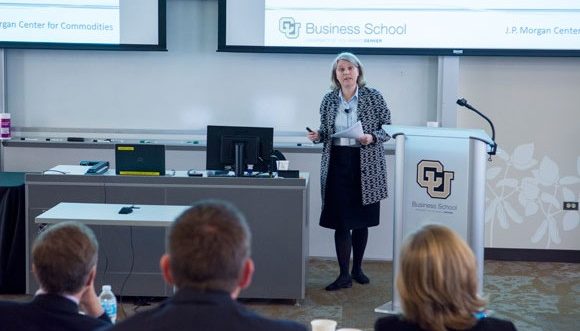
As a major hub for agriculture, energy, metals and minerals, Colorado is a national leader in commodities. Now, the J.P. Morgan Center for Commodities at the CU Denver Business School, located in heart of Colorado’s business district, is emerging as a global source for holistic commodities research.
The J.P. Morgan Center for Commodities recently launched two initiatives that bring academics and business practitioners together. The center started a digital journal, Global Commodity Issues (Editor’s Choice), and established an international Research Council on Commodities. The goal of each is to encourage robust dialogue between researchers and practitioners as well as to drive research into wide-scope commodities issues, such as supply chain management, risk management and regulatory matters, said Ajeyo Banerjee, PhD, Center director.
“There is really no organized research activity on commodities as a whole,” Banerjee said. He noted that plenty of research is directed at various sectors — agriculture, metals and minerals, and energy — but “there is no organized group that looks across all commodities.”

‘Practical and relevant agenda’
That’s where the Research Council comes in. Twenty-six experts, a mix of renowned academics and business leaders from across the nation, met for a day at the CU Denver Business School in April. Three sessions each involved an academic presentation of a study followed by discussion about the research by both academics and practitioners.
“This was such a different activity that we were not sure that they would like to meet again,” Banerjee said of the two groups, who tend to operate within their own silos. “But it was the opposite. People came up to us and said, ‘Where do we go from here?’” Another Research Council meeting is tentatively set for November or December, and the group is planning a Denver-hosted international commodities symposium for spring 2017. Council members are laying the groundwork for research projects that incorporate student researchers and explore best-practice issues and other areas of interest to business practitioners.
“We think it’s a great way of pushing a practical and relevant agenda along with commodities research of academic rigor,” Banerjee said. He said CU Denver, as a research institution, offers a scope of enterprise that’s wider than what’s typically available through a business’s economic research department. “This will offer research into big-picture issues … the best practices have never been shared across commodities.”

Another innovative platform of shared information is the J.P. Morgan Center for Commodities-sponsored Global Commodity Issues, the first online journal devoted to commodities. The journal is part of the Social Science Research Network (SSRN), which disseminates worldwide social science research to 1.7 million users.
Through a $50,000 grant from the CME Group, the J.P. Morgan Center for Commodities provides free subscriptions to anyone interested in getting issues by email from SSRN. On a monthly basis, the Center publishes Global Commodity Issues (Editor’s Choice), where the center’s editorial team selects seven papers of wide interest to the field of commodities.
‘Targeted group of papers’
“It’s a more targeted group of papers which we think are of broader interest,” Banerjee said. “The benefit is that it projects the J.P. Morgan Center for Commodities as the source of relevant research information on commodities to the entire world, because the SSRN is looked at across the world.”
Banerjee said the SSRN selects 50 to 100 papers monthly that are posted to the Global Commodity Issues page. Marcelle Arak, PhD, research director of the J.P. Morgan Center for Commodities, leads the CU Denver Business School editorial board that chooses the papers deemed to be most relevant to commodities as a whole.

“We look for quality and how relevant the research is to the practitioner community,” said Banerjee, noting that the Editor’s Choices are among the most-downloaded of all the GCI’s posted commodities articles. “Our goal is to provide direct, relevant research to people who work in the business field and practice what is emerging.”
In just two years, the first-of-its-kind J.P. Morgan Center for Commodities has become a leader in 21st century commodities education and a global clearinghouse for the field’s latest ground-breaking research.
“As a university and Business School in an urban location we have the capacity to be the Center of relevant and rigorous research,” Banerjee said. “Located in downtown Denver, we’re directly connected to serving our business communities. That’s what differentiates us as a university and a Business School.”
Members of the J.P. Morgan Center for Commodities Research Council on Commodities:
- Sueann Ambron, former dean, senior advisor, J.P. Morgan Center for Commodities
- Thorvin Anderson, executive director, JPMorgan
- Marcelle Arak, research director, J.P. Morgan Center for Commodities
- Tom Brady, chief economist, Newmont Mining Corp.
- Colin Carter, professor of agricultural economics, University of California, Davis
- Graham Davis, professor of economics, Colorado School of Mines
- Nancy DeVore, principal, DHF Team, LLC
- Colin Fenton, managing partner and head of research, Backlight Research LLC
- Robert Gray, chief commodities strategist, Resource Capital Funds
- Bob Greer, scholar in residence, J.P. Morgan Center for Commodities
- James Hamilton, professor of economics, University of California, San Diego
- Dave Hammond, principal, Hammond International Group
- Vince Kaminski, professor, energy management, Rice University
- Lutz Kilian, professor of economics, University of Michigan
- Dan Kowalski, director, Knowledge Exchange, CoBank
- Benjamin Lee, research scientist, National Renewable Energy Laboratory
- Peter McCallum, director, global agribusiness, Bunge Limited
- Mike Miller, vice president, risk management, Ardent Mills
- Bluford Putnam, chief economist, CME Group
- Forest Reinhardt, professor of economics, Harvard Business School
- Len Sahling, vice president, Knowledge Exchange, CoBank
- Marco Sampaio, head of risk management, JBS USA
- Margaret Slade, professor emeritus of economics, University of British Columbia
- Hilary Till, Solich Scholar, J.P. Morgan Center for Commodities
- Lance Titus, managing director, Guzman Energy
- Robert Vigfusson, section chief, Federal Reserve Board
- Brian Wright, professor of agricultural economics, University of California, Berkeley


